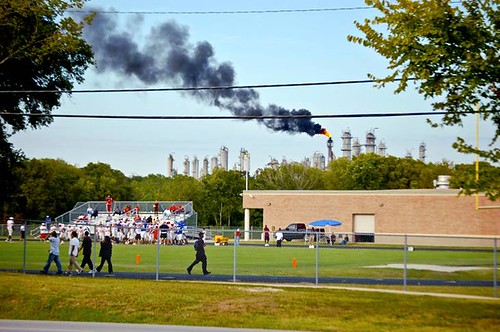Texans to Future Tar Sands Refineries: Do They Care?
Gloria Trevino doesn’t need a Washington politician to tell her that a daily gusher of Canadian tar sands crude won’t do her air in south Houston any favors. Surrounded by massive petrochemical plants, she and her neighbors in this industrial community already breathe some of the dirtiest air in the country. Her small one-story pink stucco house is sandwiched between giant multi-colored steel storage containers like a tiny doll house stuck in the middle of a field of gigantic cooking pots.
Trevino is located just a stone’s throw from a massive Valero oil refinery that would likely be a huge consumer of Canadian tar sands crude if the trans-boundary Keystone XL pipeline is built. “It’s going to hurt a lot of people,” she sighs as she looks around her lower income Latino community, where she says respiratory illness and cancer are common. “It will be like they have blood on their hands…does anyone really care?”
Watch this video of Houston residents talking about tar sands oil in their community.
“This community already has high levels of disease and cancers due to the amounts of toxic chemicals they are breathing every day,” says Juan Parras, with the Texas Environmental Justice Advocacy Services and a long-time community organizer in the Houston area. "The Keystone XL pipeline will bring even more dangerous oil for refining into our area. Why should we think people will be protected then if they aren’t even now?”
It doesn’t take a trained epidemiologist to understand that people here are at serious risk. Health studies have shown the air around these neighborhoods to be some of the most dangerous of the nation’s large urban areas. In a ground breaking investigation published in 2005, former Houston Chronicle reporter Dina Cappiello found toxic and cancer-causing compounds such as 1,3 butadiene and benzene in Manchester were as much as 20 times higher than federal guidelines used for toxic waste dumps.
By nature, oil refineries are dirty and dangerous places to live near. But processing thick, corrosive Canadian tar sands crude requires even more chemicals processing, putting people who live nearby at greater risk. An NRDC report describes the health threats from tar sands oil this way:
Pollutants from tar sands refineries contribute to a wide range of human health problems, which include heart and lung disease, asthma, and cancer. Many of the refineries proposing to take tar sands oil are located in areas that already do not meet air quality standards. Tar sands oil contains more sulfur, nitrogen, and metals (including lead, nickel, mercury, and arsenic) than conventional crudes.5 They also create emissions of sulfur dioxide (SO2) and nitrous oxide (NOx), which contribute to acid rain. In addition, the tar sands refining process stresses water resources, demanding vast amounts of fresh water, and producing ammonia and sludge.
Last year, Houston Mayor Houston Mayor Annise D. Parker also raised concerns about the impact of Keystone XL tar sands oil imports into these communities in a letter addressed to Secetary of State Hillary Clinton.
“I write to add my voice to that of the Environmental Protection Agency (EPA) and others recommending that the State Department provides additional analysis and information for the proposed Keystone XL Pipeline project. There are a number of issues that were not sufficiently address in the current Draft EIS. Both the EPA and the City of Houston are concerned with the potential for increased air emissions of air pollutants at Texas refineries, the effects on low income communities surrounding the proposed pipeline site, and the safety and spill response preparation.”
As our politicians weigh the merits of building the $7 billion Canadian tar sands pipeline, they shouldn't just worry about safely transporting millions of gallons of the dirtiest oil on the planet through the breadbasket of our most precious water aquifers and farmlands. They need to think about the Americans who live next to the pollution-belching refineries that will process this corrosive foreign crude, the Americans that politicians don’t talk about much.

Gloria Trevino in Manchester/Houston Photo: Rocky Kistner/NRDC

School near refineries in Manchester/Houston Photo: Bryan Parras/TEJAS
Before we make this historic pipeline decision, our political leaders ought to talk to the mothers on the playgrounds saturated by the sulfurous smell of America’s petrochemical complexes; ask them what they think about building a 1,700 mile river of Canadian crude into their communities?
The fear—and sadness—in their eyes will be the only answer they will need.
